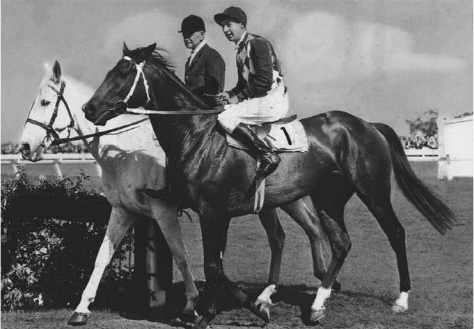Best Australian Racing Stories (34 page)
It was a favourite device of Dennis's to find some aspect of Aussie life outside racing and fasten on that as his focus for the Cup each year. In 1931 he delighted in the news that the Australian Naval Squadron just âhappened' to be stationed in Melbourne during Cup Week.
Typically, Dennis saw no harm in this amazing âcoincidence' and celebrated the Aussie predeliction for making the most of the situation and putting âpleasure' before âbusiness' when it suited and if at all possible.
He wrote a rollicking sea shanty in 1931 in praise of our brave sailors, which was, in fact, another poetic celebration of what Mark Twain described as âThe Australasian National Day'. Dennis prefaced this verse with the tongue-in-cheek comment that, âthrough the usual coincidence many ships, including the Australian Naval Squadron, have reached Melbourne just prior to Cup Week'.
C.J. Dennis
Up the hook, the bosun said;
(Ho, me hearties, ho!)
There's heavy weather on ahead
(Tumble up, below!)
There's dirty weather coming down,
Our course is set for Melbourne town
And a queer thing that should be!
So show a leg and tumble up,
And pick your fancy for the Cup
With the good ship running free.
Funny thing, the boatman said,
(Ho, me hearties, ho!)
But when November looms ahead
(Tumble up, below!)
To Melbourne Port the orders say,
And nothing's left but to obey,
For the likes of you and me.
And what's a sailor to do,
When duty calls, but see it through,
With the good ship running free?
If I should win, the boatman said;
(Ho, me hearties, ho!)
I'll buy myself a feather bed
(Tumble up, below!)
And never put to sea again.
Yet luck ain't kind to sailor men,
But I'll get my fun, said he.
And every man shall have his lass,
And make his bet and drink a glass,
To a good horse running free, said he,
And that's the life for me!
Two years later the poet turned his attention to the phenomenon of radio, which was profoundly changing the Australian lifestyle.
In a nation as large and sparsely populated as Australia the coming of âthe wireless' meant quite dramatic changes to everyday life. Australia became a nation of âlisteners' able, for the first time, to communicate quickly and share in world events as they happened.
This phenomenon only enhanced the importance of âThe Cup' as an essential part of Aussie culture. Dennis realised the impact this was having and, in one of his âCup Week' poems of 1933, he celebrated this new way of being involved in the thrill and excitement of âThe Cup'.
C.J. Dennis
This is the listening week of the yearâ
Listening-in.
A-cock and alert is the national earâ
Listening-in.
All over the land in the country towns,
From the back of the Leeuwin to Darling Downs,
Layers of âquids' or the odd half-crowns,
They are listening-in.
On the far-flung farms they are round each set,
Listening-in.
The work and the worry they all forget,
Listening-in.
Wherever an aerial soars in space
To the Cup, or the Oaks or the Steeplechase,
To the roar of the ring and the lure of the race
They are listening-in.
In the far outback there are sun-tanned men,
Listening-in.
Where the woolshed stands by the drafting penâ
Listening-in.
Old Dad's come in from the Ninety Mile;
He scored on the Cup and he wears a smile,
And he âreckons this game is well worth while',
So he's listening-in.
To the edge of the desert the sound-waves go;
And, listening-in,
Ned of the Overland, Saltbush Joe,
Listening-in,
Recall the giants of years long past,
And the loneliness of these spaces vast;
But they reckon that life's worth living at last
With this listening-in.
Although he often wrote about the âmug punters', Dennis rarely concerned himself with the feats of the horses themselves, or the jockeys, trainers or owners. He was able to convey the effects of Cup Week on all and sundry. In 1932 he even wrote about the effect of the Spring Carnival obsession on himself, and other poets.
C.J. Dennis
Oh, this is the week when no rhymster may rhyme
On the joy of the bush or the ills of the time,
Nor pour out his soul in delectable rhythm
Of women and wine and the lure they have with 'em,
Nor pen philosophic (if foolish) discourses,
Because of the fury of galloping horses.
Galloping, galloping thro' the refrainâ
The lure and the lilt of it beat on the brain.
Strive as you may for Arcadian Themes,
The silks and the saddles will weave thro' your dreams.
Surging, and urging the visions aside
For a lyrical lay of equestrian pride,
For the roar of the race and the call of the courses,
And galloping, galloping, galloping horses.
This is the week for the apotheosis
Of Horse in his glory, from tail to proboscis.
That curious quadruped, proud and aloof,
That holds all the land under thrall of his hoof.
All creeds and conditions, all factions and forces,
All, all must give way to the galloping horses.
Galloping, gallopingâsinner and saint
March to the metre, releasing restraint.
If it isn't the Cup it's the Oaks or the Steeple
That wraps in its magic the minds of the people.
Whether they seek it for profit or pleasure,
They all, willy-nilly, must dance to the measure.
The mood of the moment in all men endorses
The glamorous game and the galloping horsesâ
Galloping horsesâjockeys and coursesâ
They gallop, we gallop with galloping horses.
Dennis used the fervour and excitement of Cup Week to celebrate all aspects of the Aussie character and human nature. Even the less admirable machinations of married middle-class couples were grist to the mill of his perceptive and humorous verses.
One of Dennis's favourite writing styles was the âone-sided conversation' in which the reader is presented with only one voice in a conversation and the humour comes, in part, from guessing the obvious âother side' of the dialogue.
In several Cup Week poems Dennis used this device to great effect to illustrate, and comment on, the never-ending âcold war' of Machiavellian plotting, game-playing and deceit that is a part of the age-old battle of the sexes in middle-class marriages.
In âListen, Elaine' the husband is slowly stripped of his Cup Day punting money by a wife keen on using The Cup as the excuse to obtain an entire new wardrobe. The only voice we hear is that of the husband, firstly making unsuccessful attempts to keep his wife in her old dress:
âIf you just wore . . . Now, just a minute, please . . .
That pinkish frock . . . No, wait! Let me explain.
That pinkish frock with spots . . . You wouldn't freeze!
You've got your furs. Aw, listen, please, Elaine!'
Of course, the punter's need for betting money is of no concern to a fashion-conscious wife. As many of us can attest, wives often obstinately fail to understand the real purpose of race meetings.
Dennis hilariously captures the dilemma of the doomed husband whose âlogic', we all know from experience, will inevitably fail to impress. We are moved to laughter by the all-too-familiar pleas of a fellow sufferer when the husband tries appeasement:
âNow, look. We've twenty pounds. Don't let us quarrel.
Surely we can be sane and quite grown-up.
If you take most of that, what of the âmoral'
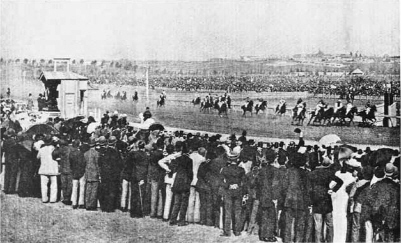
Archer pictured in a newspaper sketch of the day, carrying Etienne de Mestre's famous all-black colours. (Courtesy of AJC)
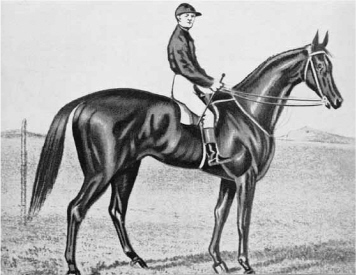
The Cup-day crowd watch Bravo win the 1889 Melbourne Cup.
(Courtesy of VRC)
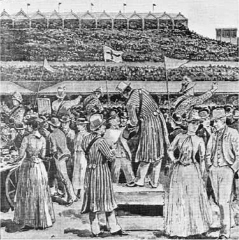
A newspaper artist's impression of the 1891 Cup atmosphere at Flemington. (Courtesy of VRC)
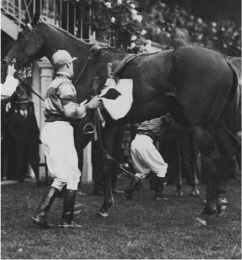
Darby Munro unsaddles Peter Pan after winning the Duke of Gloucester Cup at Flemington, 10 November 1934, four days after winning his second Melbourne Cup. (Courtesy of ARM)
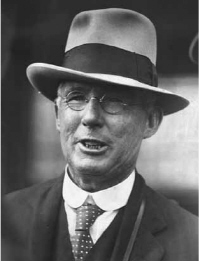
Frank McGrathâthe master trainer of great stayers such as Peter Pan, Prince Foote and Amounis. (Courtesy of Newspix)
